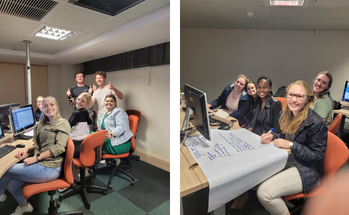The BCom Honours Marketing Management and BCom Honours in Tourism students were exposed to two research workshops in Semester 1 and Semester 2 respectively, by the module lecturer, Dr Michael Humbani. The sessions are a long-term commitment to capacity development for the postgraduate students, geared at preparing them for either the world of work or for furthering their studies.
The training sessions were initiated in 2019 for the BCom honours group and have become a standard practice for the postgraduate students. As part of the curriculum, the students embark on a research programme to gain knowledge about and master the fundamental processes, principles and techniques necessary for quantitative survey-based research. In the first semester, students compile a research proposal that is executed during the second semester as part of their research project module. This year, the focus for the research projects was the propensity of consumers’ intention to continue to use mobile food delivery applications (apps) beyond COVID-19.
Thulani Mahlangu in action, showing students how to utilise the University website to access pertinent information
The first workshop was held on 7 March 2022 and was facilitated by the departmental information specialist, Thulani Mahlangu. There is no doubt that the South African restaurant industry, like in any other country, has been adversely affected by the pandemic, forcing the industry to change its business model. As such, the industry has introduced a myriad of mobile food delivery apps, yet research on consumers’ intention to continue to use these apps is lacking in context. Based on the above, students were tasked with investigating the likelihood of whether consumers who transitioned to mobile food delivery apps in response to lockdown rules, would continue to use these apps in the future, with the view to suggesting pragmatic solutions to service providers on how to manage crises of a similar nature in the future.
A workshop of this nature was necessary for the following reasons:
-
To assist students to identify appropriate literature in joining the current conversations on the topic.
-
To help students navigate the University of Pretoria’s library homepage to access important documents such as the plagiarism policy, Harvard style of referencing and relevant training sessions that can boost their research skills.
-
How to access e-textbooks and extract relevant chapters from the e-textbook, and how to cite such sources.
The workshop was well received by the students, judging from fruitful discussions arising from their participation. Having acquired the knowledge to do literature reviews and proper citations to avoid plagiarism, the need to write properly in an academic way became even more important. Indeed, it was from this highly interactive session that the need for an academic writing workshop was highlighted. Hence, the workshop proved highly successful, demonstrating a keen appetite for students’ upskilling in terms of academic writing.
Following this successful library session, a second workshop.

Left: Honours students in the break-away session for the academic writing workshop
Right: Students discussing the challenges of academic wring during the break-away session
Students were taken through a highly interactive session by Ehlers, which included break-away sessions and group presentations to facilitate the learning of much-needed writing skills.
The workshop included watching video clips on academic writing, and referring the students to important sources that could assist them in improving their writing skills. The timing of the workshop could not have been more convenient, as students were busy finalising their research reports for examination.
Indeed, it can be inferred that the session served as an impetus for students to immediately start working on their research reports whilst the ideas were still fresh, as many of them promised research reports of high quality. All participants expressed their profound appreciation for both workshops, and suffice it to say that these workshops will be incorporated into the curriculum of BCom Honours Marketing Management and BCom Honours in Tourism programmes in the foreseeable future.


Get Social With Us
Download the UP Mobile App